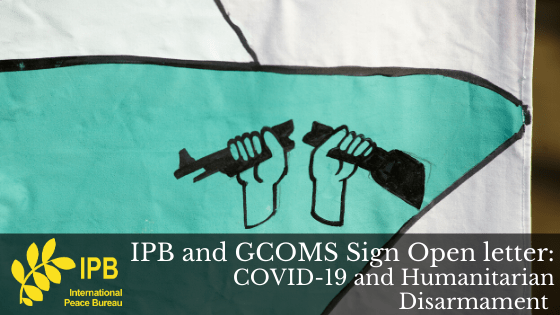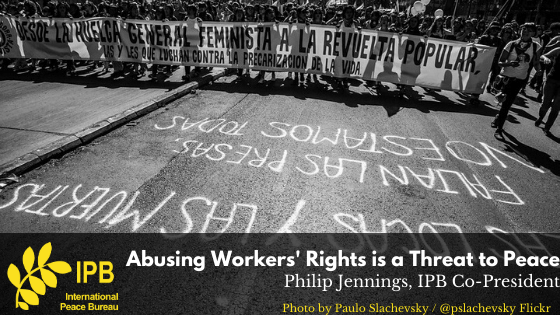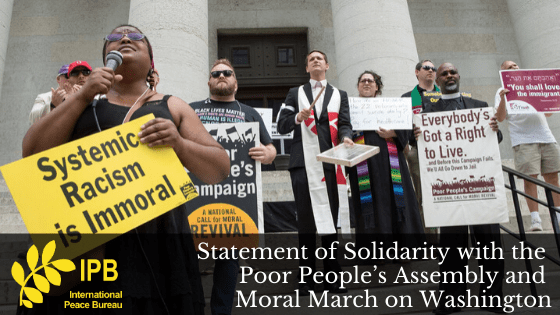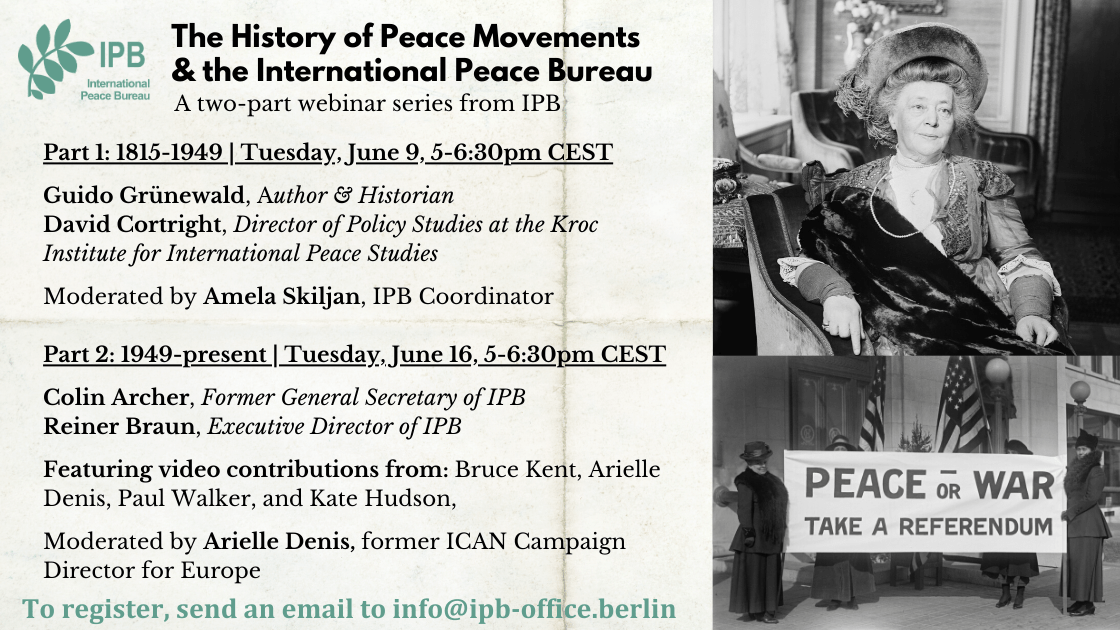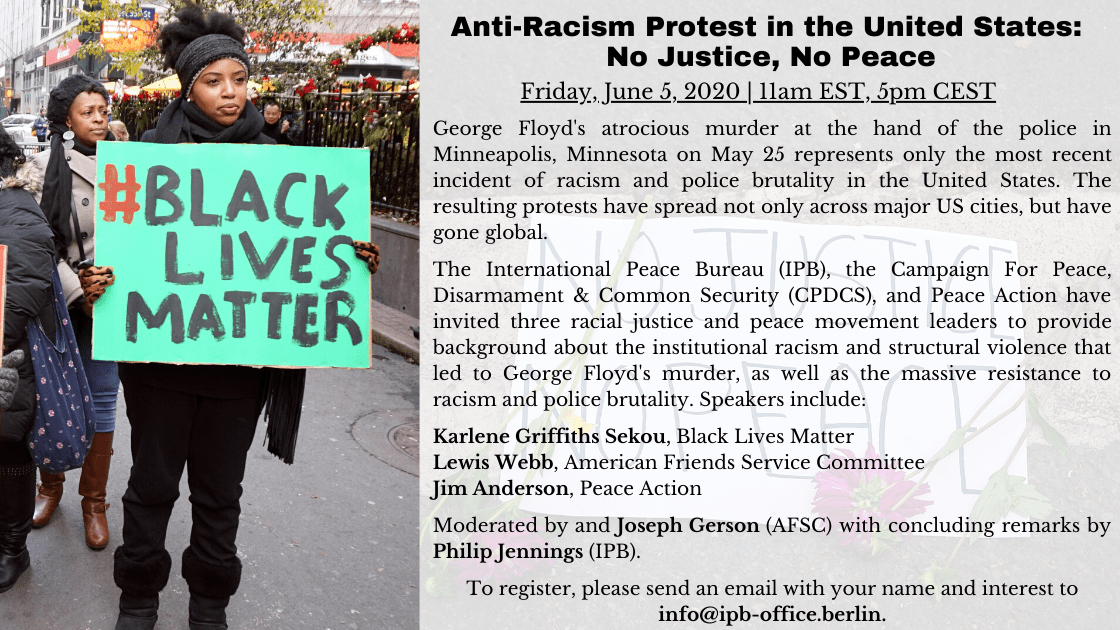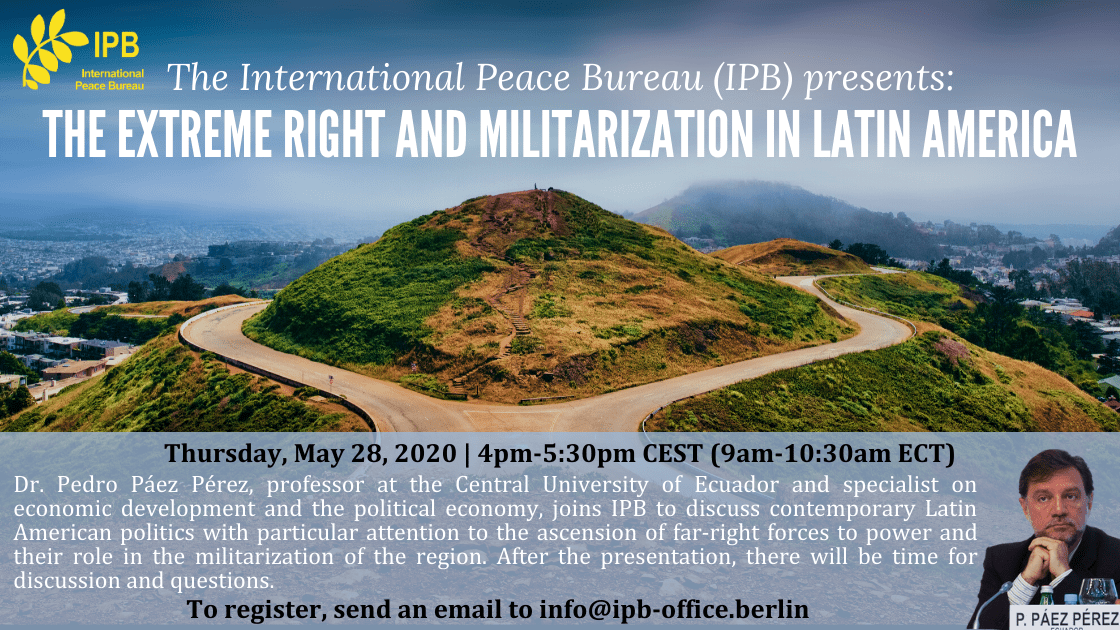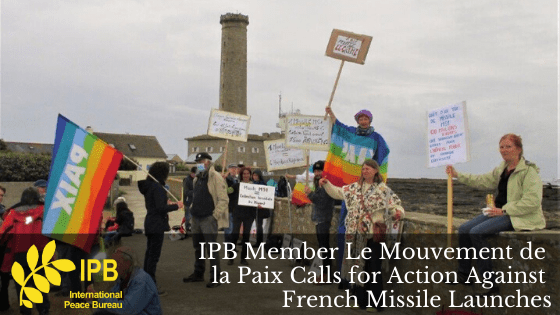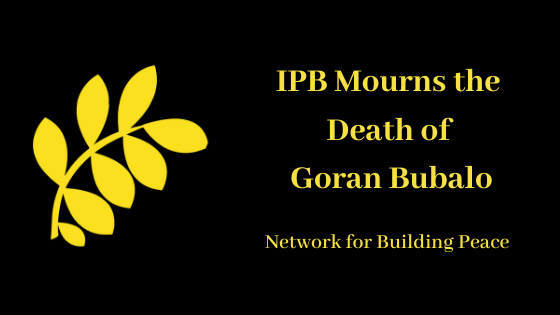The IPB and GCOMS have signed the following open letter created by ‘Humanitarian Disarmament.’ The letter argues that humanitarian disarmament can lead the way to an improved post-pandemic world and calls on states, international organizations, and civil society to follow its lead to create a “new normal.” It is open for signature by civil society organizations through the form here. Continue reading “Open Letter on COVID-19 and Humanitarian Disarmament”
News
The IPB supports the Peace Wave, August 6-9, 2020
The Organizing Committee of the World Conference against A and H Bombs met on May 8 in full session and proposed that on August 6 through 9 of this 75th year of the A-bomb tragedies it launches an international joint grassroots action “Peace Wave” with the common aim of the elimination of nuclear weapons and with the signature campaign for the “Appeal of the Hibakusha for the Elimination of Nuclear Weapons” (petition enclosed) as our common action. Continue reading “The IPB supports the Peace Wave, August 6-9, 2020”
Abusing Workers’ Rights is a Threat to Peace: IPB Reacts to the 2020 ITUC Global Rights Index (EN/FR)
Abusing workers’ rights is a threat to peace.
The IPB has always considered the respect for human and workers rights as critical pillars for peace in our nations. Abuse these fundamental rights and the floodgates are open to weaken peace, democracy and social justice. Take away the freedom of expression, protest, association and the balance of power tips further toward authoritarianism and raw and abusive corporate power. Continue reading “Abusing Workers’ Rights is a Threat to Peace: IPB Reacts to the 2020 ITUC Global Rights Index (EN/FR)”
Statement of Solidarity with the Poor People’s Assembly and Moral March on Washington
June 17, 2020
The International Peace Bureau, a Nobel Peace Prize recipient organization, was proud and fortunate to collaborate with the Poor People’s Campaign on last spring’s Online World Conference 2020: Abolish Nuclear Weapons, Resist and Reverse Climate Change, for Social and Economic Justice. The Poor People’s Campaign’s recognition of the seminal importance of building on Martin Luther King, Jr.’s nonviolent commitments – to challenge the mutually reinforcing triple evils of racism, poverty and militarism, with the addition of your commitment to environmental sustainability – is precisely what our time requires, and it inspires people around the globe, as well as across the United States. Continue reading “Statement of Solidarity with the Poor People’s Assembly and Moral March on Washington”
The History of the Peace Movement and the International Peace Bureau (Two-Part Webinar Series)
IPB presented a two-part webinar series to explore the past two centuries of peace movement activities, including the role of the IPB, which was founded in 1891. Continue reading “The History of the Peace Movement and the International Peace Bureau (Two-Part Webinar Series)”
Webinar on Anti-Racism Protest in the United States: No Justice, No Peace
George Floyd’s atrocious murder at the hand of the police in Minneapolis, Minnesota on May 25 represents only the most recent incident of racism and police brutality in the United States. The resulting protests have spread not only across major US cities, but have gone global. Continue reading “Webinar on Anti-Racism Protest in the United States: No Justice, No Peace”
Webinar on The Extreme Right and Militarization in Latin America
On the 28th of May, Dr. Pedro Páez Pérez, professor at the Central University of Ecuador and specialist on economic development and the political economy, joined IPB to discuss contemporary Latin American politics with particular attention to the ascension of far-right forces to power and their role in the militarization of the region. Continue reading “Webinar on The Extreme Right and Militarization in Latin America”
Le Mouvement de la Paix Calls for Action Against French Missile Launches
*Update on June 12
Firing of an M51 Missile on June 12
At 8:20 am, the Téméraire, a nuclear-powered ballistic missile submarine (SNLE) successfully fired an M51 strategic ballistic missile at the tip of Penmarc’h in Finistère. “This test demonstrates our technological excellence and our attachment to French sovereignty” declared Florence Parly, Minister of Defence. The government is therefore insisting on launching its new missile campaign in Brittany not only in violation of the NPT, the Treaty on the Non-Proliferation of Nuclear Weapons signed by France, but also in defiance of the real financial requirements of the present time and still environmental requirements. Let us recall that a missile costs 120 million euros, a sum which represents the gross annual salary of 7500 nurses. This missile is designed to carry six atomic bombs, each of which can destroy a city like Paris in a few seconds. Indignation and protest among many citizens: the pandemic has revealed, if proof were needed, that the real priorities must be given to health, social and environmental emergencies and not to expensive tests for better performance of our works of death.
In compliance with health precautionary measures, demonstrations, at the initiative of the Peace Movement, which denounced these tests, took place in various cities and on the very premises of the operation’s command centre, where some sixty people gathered at the tip of Penmarc’h, near the semaphore and the vessel providing the fire command logistics.
The original text in French can be found below.
Together we reject the new tests of M 51 nuclear missile in Brittany
In the midst of a health crisis, the government insists on developing its new nuclear weapons programs to the detriment of health, social and environmental priorities.
This obstinacy is expressed through a new campaign of tests of the Nuclear Missile M51 (1) organized, from 9 June and over several weeks, from the point of Penmarc’h in Brittany.
These weapons of mass destruction, dangerous for the survival of humanity, are illegal under international law, immoral, useless for our security and costly.
To express their opposition to this campaign, the Brittany committees of Le Mouvement de la Paix decided to organize citizen initiatives in the form of pickets of protest, or protest circles, or picnics for peace, and this in compliance with the rules of health prudence, in different cities of Brittany (Nantes, Rennes, Lannion, Saint Malo, Penmarc’h, Morlaix, etc.)
Le Mouvement de la Paix at the national level supports these initiatives and calls everywhere in France its committees, citizens and all organizations that consider it necessary to reverse the priorities in favor of health and environmental emergencies, to amplify this movement through multiform local actions in the maximum number of cities.
In the respect of the measures of health precautions, protest gatherings with about ten people can be organized in the coming days and until the end of June in front of the town halls, privileged places of expression of the citizenship, or in front of the prefectures, symbolic places of state power. The priorities in favour of health, social and ecological security of the population, in favour of an ambitious multiannual programme for public hospitals and homes for senior and dependent persons, and a plan for ecological security must be expressed forcefully.
At the same time must be expressed the requirement, shared by 78% of the French (2), of visible political acts in favor of nuclear disarmament by the French government, like the freezing of new nuclear weapons modernization programs and the signing of the Treaty on the Prohibition of Nuclear Weapons adopted at the United Nations in July 2017. Every citizen can also support this initiative by signing the petition so that France and all the states of the world ratify the Treaty.
Le Mouvement de la Paix – June 9, 2020
(1) Each M51 missile costs 120 million euros, which represents the annual gross salary of 7,500 nurses. Each M51 carries six atomic bombs, each of which can destroy a city like Paris in seconds. Each of the 4 French nuclear submarines carries 16 nuclear missiles. The replacement of these 4 nuclear submarines, which is at the heart of the military programming law passed by the government majority, constitutes a violation of Article 6 of the Nuclear Non-proliferation Treaty (NPT).
(2) Ifop survey/La Croix/ Le Mouvement de la Paix/ Planète Paix .
*mise à jour du 12 juin
Tir d’un Missile M51 le 12 juin
A 8h20, le Téméraire, sous-marin nucléaire lanceur d’engins (SNLE) a tiré avec succès un missile balistique stratégique M51 à la pointe de Penmarc’h dans le Finistère. « Cet essai démontre notre excellence technologique et notre attachement à la souveraineté française » a déclaré Florence Parly, Ministre de la Défense. Le gouvernement s’obstine donc à lancer sa nouvelle campagne de tirs de missiles en Bretagne non seulement en violant le TNP, traité de Non-Prolifération des Armes Nucléaires signé par la France mais aussi au mépris des vraies exigences financières actuelles et toujours environnementales. Rappelons qu’un missile coûte 120 millions d’euros, somme qui représente le salaire brut annuel de 7500 infirmières. Ce missile est conçu pour porter six bombes atomiques dont chacune peut détruire une ville comme Paris en quelques secondes. Indignation et protestation parmi de nombreux citoyens : la pandémie a révélé, s’il en était besoin, que les vraies priorités doivent être portées vers les urgences sanitaires, sociales et environnementales et non vers des essais coûteux pour de meilleures performances de nos œuvres de mort.
Dans le respect des mesures de précaution sanitaires, des manifestations, à l’initiative du Mouvement de la Paix qui dénonce ces essais, ont eu lieu dans différentes villes et sur les lieux même du centre de commandement de l’opération où une soixantaine de personnes se sont retrouvées à la pointe de Penmarc’h, à proximité du sémaphore et du bâtiment assurant la logistique de commandement du tir.
Ensemble refusons la nouvelle campagne de tirs du missile nucléaire M 51 depuis la pointe de la Bretagne
En pleine crise sanitaire, le gouvernement s’obstine à développer ses nouveaux programmes en faveur des armes nucléaires au détriment des priorités sanitaires, sociales et environnementales.
Cette obstination s’exprime à travers une nouvelle campagne de tirs d’essais du Missile Nucléaire M51 (1) organisée, à partir du 9 juin et sur plusieurs semaines, depuis la pointe de Penmarc’h en Bretagne.
Ces armes de destruction massive, dangereuses pour la survie de l’humanité, sont illégales au vu du droit international, immorales, inutiles pour notre sécurité et coûteuses.
Pour dire leur opposition à cette campagne, les comités de Bretagne du Mouvement de la Paix ont décidé d’organiser des initiatives citoyennes sous forme de piquets de protestation, ou cercles de protestation, ou pique-niques pour la Paix dans différentes communes de Bretagne et ce dans le respect des règles de prudence sanitaire (Nantes, Rennes, Lannion, Saint Malo, Penmarc’h, Morlaix…)
Le Mouvement de la Paix au plan national apporte son soutien à ces initiatives et appelle partout en France ses comités, les citoyennes et citoyens et toutes les organisations qui estiment nécessaires d’inverser les priorités en faveur des urgences sanitaires et environnementales, à amplifier ce mouvement à travers des actions locales multiformes dans le maximum de communes.
Dans le respect des mesures de précautions sanitaires, des cercles de protestation regroupant une dizaine de personnes peuvent être organisés dans les jours qui viennent et jusqu’à la fin du mois de juin devant les mairies lieux privilégiés d’expression de la citoyenneté ou les préfectures lieux symboliques du pouvoir de l’Etat.
Les priorités en faveur de la sécurité sanitaire, sociale et écologique des populations, en faveur d’un programme pluriannuel ambitieux pour les hôpitaux publics et les EHPAD, d’un plan pour la sécurité écologique doivent être exprimées avec force.
Dans le même temps doit s’exprimer l’exigence, partagée par 78 % des français (2), d’actes politiques visibles en faveur du désarmement nucléaire de la part du gouvernement de la France, comme le gel des nouveaux programmes de modernisation des armes nucléaires et la signature du Traité d’interdiction des armes nucléaires (TIAN) adopté à l’Onu en juillet 2017. Chaque citoyen peut aussi soutenir cette démarche en signant la pétition pour que la France et tous les Etats du monde ratifient le TIAN.
Le Mouvement de la Paix – 9 juin 2020
- Chaque missile M51 coûte 120 millions d’euros, somme qui représente le salaire brut annuel de 7500 infirmières. Chaque M51 porte six bombes atomiques dont chacune peut détruire une ville comme Paris en quelques secondes. Chacun des 4 sous-marins nucléaires français est porteur de 16 missiles nucléaires.Le remplacement de ces 4 sous-marins nucléaires, qui est au cœur de la loi de programmation militaire votée par la majorité gouvernementale, constitue une violation de l’article 6 du Traité de Non- Prolifération Nucléaire (TNP).
- Sondage Ifop/La Croix/Mouvement de la Paix/Planète Paix.
IPB Mourns the Death of Goran Bubalo
IPB lost a strong and courageous fighter for peace – Goran Bubalo died on June 9th 2020. After a brief but serious illness, our friend in peace died. IPB is deeply saddened by this loss.
Goran Bubalo was an activist deeply committed to peace every single day of his life. He was the chair of the Bosnian Network for Building Peace, an active member of IPB. With his great help, we managed to arrange the international Sarajevo Peace Event in 2014. We were in contact with him until last month.
We will never forget him! Goran, we will continue working intensively for peace without you, but in your spirit.
World Conference Youth Assembly Report
Prepared By: Emily Rubino, Director of Policy and Outreach at Peace Action New York State, Co-chair of the Youth Assembly Planning Committee.
On May 2, 2020, one week after the Online World Conference: Abolish Nuclear Weapons, Resist and Reverse Climate Change, For Social and Economic Justice, the first World Conference Youth Assembly event took place from 9am-11am EST (1:00-3 pm GMT, 10:00-12 pm JST). The event took place with over 370 Zoom participants from 50+ countries around the world, including the United States, Japan, Nepal, the United Kingdom, Kenya, and Germany. It was also live-streamed on Youtube, though there were some technical difficulties that prevented the livestream from starting at the very beginning of the conference. A full recording of the Youth Assembly can be found here. Continue reading “World Conference Youth Assembly Report”

